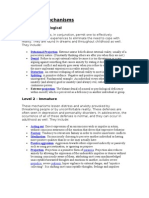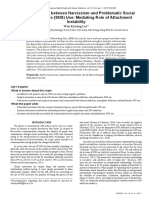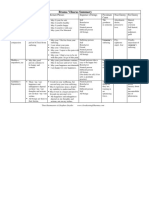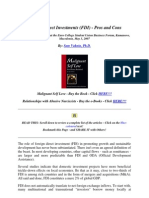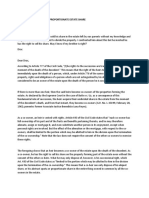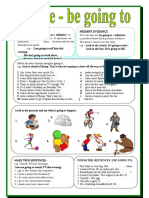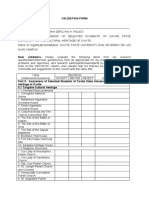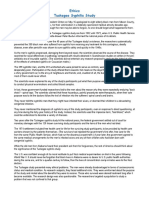Narcissistic Personality Disorder in The DSM V
Narcissistic Personality Disorder in The DSM V
Uploaded by
zadanliranCopyright:
Available Formats
Narcissistic Personality Disorder in The DSM V
Narcissistic Personality Disorder in The DSM V
Uploaded by
zadanliranOriginal Title
Copyright
Available Formats
Share this document
Did you find this document useful?
Is this content inappropriate?
Copyright:
Available Formats
Narcissistic Personality Disorder in The DSM V
Narcissistic Personality Disorder in The DSM V
Uploaded by
zadanliranCopyright:
Available Formats
Narcissistic Personality Disorder in the DSM V
By Sam Vaknin Author of "Malignant Self-love: Narcissism Revisited"
The DSM V re-defines personality disorders thus:
"The essential features of a personality disorder are impairments in personality (self and interpersonal) functioning and the presence of pathological personality traits."
According to the June 2011 text of the DSM V, the following criteria must be met to diagnose Narcissistic Personality Disorder (in parentheses my comments): Significant impairments in personality functioning in either identity, or selfdirection (should be: in both.) Identity The narcissist keeps referring to others excessively in order to regulate his selfesteem (really, sense of self-worth) and for "self-definition" (to define his identity.) His self-appraisal is exaggerated, whether it is inflated, deflated, or fluctuating between these two poles and his emotional regulation reflects these vacillations. (Finally, the DSM V accepted what I have been saying for decades: that narcissists can have an "inferiority complex" and feel worthless and bad; that they go through cycles of ups and downs in their self-evaluation; and that this cycling influences their mood and affect.) Self-direction The narcissist sets goals in order to gain approval from others (narcissistic supply; the DSM V ignores the fact that the narcissist finds disapproval equally rewarding as long as it places him firmly in the limelight.) The narcissist lacks self-awareness as far as his motivation goes (and as far as everything else besides.) The narcissist's personal standards and benchmarks are either too high (which supports his grandiosity), or too low (buttresses his sense of entitlement, which is incommensurate with his real-life performance.) Impairments in interpersonal functioning in either empathy or intimacy (should be: in both.) Empathy The narcissist finds it difficult to identify with the emotions and needs of others, but is very attuned to their reactions when they are relevant to himself (cold
empathy.) Consequently, he overestimates the effect he has on others or underestimates it (the classic narcissist never underestimates the effect he has on others - but the inverted narcissist does.) Intimacy The narcissist's relationships are self-serving and, therefore shallow and superficial. They are centred around and geared at the regulation of his self-esteem (obtaining narcissistic supply for the regulation of his labile sense of self-worth.) The narcissist is not "genuinely" interested in his intimate partner's experiences (implying that he does fake such interest convincingly.) The narcissist emphasizes his need for personal gain (by using the word "need", the DSM V acknowledges the compulsive and addictive nature of narcissistic supply). These twin fixtures of the narcissist's relationships render them one-sided: no mutuality or reciprocity (no intimacy). Pathological personality traits Antagonism characterized by grandiosity and attention-seeking Grandiosity The aforementioned feeling of entitlement. The DSM V adds that it can be either overt or covert (which corresponds to my taxonomy of classic and inverted narcissist.) Grandiosity is characterized by self-centredness; a firmly-held conviction of superiority (arrogance or haughtiness); and condescending or patronizing attitudes. Attention-seeking The narcissist puts inordinate effort, time, and resources into attracting others (sources of narcissistic supply) and placing himself at the focus and centre of attention. He seeks admiration (the DSM V gets it completely wrong here: the narcissist does prefer to be admired and adulated, but, failing that, any kind of attention would do, even if it is negative.) The diagnostic criteria end with disclaimers and differential diagnoses, which reflect years of accumulated research and newly-gained knowledge: The above enumerated impairments should be "stable across time and consistent across situations ... not better understood as normative for the individuals developmental stage or socio-cultural environment ... are not solely due to the direct physiological effects of a substance (e.g., a drug of abuse, medication) or a general medical condition (e.g., severe head trauma)."
Abolish Narcissistic Personality Disorder (NPD) in DSM V? - Click HERE to Watch the Video DSM V proposed diagnostic criteria for Narcissistic Personality Disorder available HERE. Read more about the shortcomings of the DSM IV and how they are tackled in the DSM V - click HERE.
Bibliography
Goldman, Howard H., Review of General Psychiatry, fourth edition,1995.PrenticeHallInternational, London. Gelder, Michael, Gath, Dennis, Mayou, Richard, Cowen, Philip (eds.),Oxford Textbook of Psychiatry, third edition, 1996, reprinted 2000. Oxford University Press, Oxford. Vaknin, Sam, Malignant Self-love: Narcissism Revisited, eighth revised impression, 1999-2006. Narcissus Publications, Prague and Skopje. Westen, Drew et al. Refining the Construct of Narcissistic Personality Disorder: Diagnostic Criteria and Subtypes (Posted at http://ajp.psychiatryonline.org/pap.dtl)
=================================== Author Bio Sam Vaknin ( http://samvak.tripod.com ) is the author of Malignant Self-Love: Narcissism Revisited
and After the Rain - How the West Lost the East, as well as many other books and ebooks about topics in psychology, relationships, philosophy, economics, and international affairs. He is the Editor-in-Chief of Global Politician and served as a columnist for Central Europe Review, PopMatters, eBookWeb , and Bellaonline, and as a United Press International (UPI) Senior Business Correspondent. He was the editor of mental health and Central East Europe categories in The Open Directory and Suite101. Visit Sam's Web site at http://www.narcissistic-abuse.com
You might also like
- Cold Therapy Seminar Level 1 Lecture NotesDocument10 pagesCold Therapy Seminar Level 1 Lecture Noteszadanliran100% (7)
- Introduction To Human CommunicationDocument21 pagesIntroduction To Human CommunicationNur Fadilla JafarNo ratings yet
- NIDA5 Diary CardDocument1 pageNIDA5 Diary CardTrevaNo ratings yet
- Young Adult Narcissism - A 20 Year Longitudinal StudyDocument10 pagesYoung Adult Narcissism - A 20 Year Longitudinal StudyDanielaNo ratings yet
- Speech Outline SamplelDocument4 pagesSpeech Outline SamplelAna Karina AuadNo ratings yet
- Once Hurt, Twice Shy - Social Pain Contributes To Social AnxietyDocument9 pagesOnce Hurt, Twice Shy - Social Pain Contributes To Social AnxietyAndrés SánchezNo ratings yet
- Multidimensional Anger TestDocument1 pageMultidimensional Anger TestMurphy ReedNo ratings yet
- Barton - 1994 - Chaos, Self-Organization, and Psychology PDFDocument10 pagesBarton - 1994 - Chaos, Self-Organization, and Psychology PDFYesimNo ratings yet
- Sam Vaknin's Autobiography (1961-1996) - Handwritten ManuscriptDocument243 pagesSam Vaknin's Autobiography (1961-1996) - Handwritten ManuscriptzadanliranNo ratings yet
- Requesting My Loved One (HEBREW)Document248 pagesRequesting My Loved One (HEBREW)zadanliranNo ratings yet
- Love and Relationship AnalysisDocument6 pagesLove and Relationship Analysisalicia.cNo ratings yet
- Characteristics of Narcissistic PersonalityDocument63 pagesCharacteristics of Narcissistic PersonalitymichellebrackenNo ratings yet
- Parts: of PsycheDocument10 pagesParts: of PsycheFlower100% (2)
- Borderline Personality Disorder: Raising Questions, Finding AnswersDocument4 pagesBorderline Personality Disorder: Raising Questions, Finding AnswerslalichompyNo ratings yet
- Defense MechanismsDocument3 pagesDefense MechanismsJennifer JohnstonNo ratings yet
- Conflict Management FinalDocument7 pagesConflict Management Finalma. lilibeth tagaanNo ratings yet
- Self-Awareness and Issue of Emotional IntelligenceDocument15 pagesSelf-Awareness and Issue of Emotional IntelligenceMUDIT SHARMANo ratings yet
- Couples Counseling PosterDocument1 pageCouples Counseling PosterSilvana de JesusNo ratings yet
- Setting Professional BoundariesDocument22 pagesSetting Professional BoundariesRustam Koshelev100% (1)
- Co Narcissism ArticleDocument8 pagesCo Narcissism ArticleSadDratNo ratings yet
- How To Spot A NarcissistDocument2 pagesHow To Spot A Narcissistjovanab017No ratings yet
- HDCS 4393/4394 Internship Dr. Shirley EzellDocument9 pagesHDCS 4393/4394 Internship Dr. Shirley EzellFakhreddine WiemNo ratings yet
- Ketamine Fact SheetDocument2 pagesKetamine Fact Sheetthor888888No ratings yet
- The Relationship Between Narcissism and Problematic Socialnetworking Sites Sns Use Mediating Role of Attachment Instability 1522 4821 1000366Document5 pagesThe Relationship Between Narcissism and Problematic Socialnetworking Sites Sns Use Mediating Role of Attachment Instability 1522 4821 1000366Jannelyn CruzNo ratings yet
- Module 3: Nonspecific Factors in Brief CBT: ObjectivesDocument5 pagesModule 3: Nonspecific Factors in Brief CBT: ObjectivesMaria BagourdiNo ratings yet
- 7 Pathways For Reconnecting After TBI CouplesDocument12 pages7 Pathways For Reconnecting After TBI CouplesRaluca HereaNo ratings yet
- CommunicationDocument20 pagesCommunicationPrajakta Gokhale100% (1)
- ManningHealing Hearts Conference 11.10.12-1 PDFDocument42 pagesManningHealing Hearts Conference 11.10.12-1 PDFSvetlana RadovanovicNo ratings yet
- Assertiveness Module 2Document10 pagesAssertiveness Module 2Marie MamatNo ratings yet
- Module 4 - Part 3 - SED 2100Document15 pagesModule 4 - Part 3 - SED 2100kylieNo ratings yet
- Dialectical Behavior TherapyDocument22 pagesDialectical Behavior Therapygourav sarafNo ratings yet
- The 4 Types of Ineffective ApologiesDocument5 pagesThe 4 Types of Ineffective ApologiesPushpendra Kumar SinghNo ratings yet
- DBT Interpersonal Effectiveness WorksheetDocument2 pagesDBT Interpersonal Effectiveness WorksheetsciptNo ratings yet
- People - Different TypesDocument5 pagesPeople - Different Typesnoelia.latronico22No ratings yet
- How To Stop Ruminating 10 Tips To Stop Repetitiv 2Document2 pagesHow To Stop Ruminating 10 Tips To Stop Repetitiv 2Swarnali BoseNo ratings yet
- BPD PDFDocument22 pagesBPD PDFSo ChNo ratings yet
- DBT Emotion DysregulationDocument4 pagesDBT Emotion DysregulationLauraLoaizaNo ratings yet
- Relationship Worksheet Name Name : C Vivyan 2010Document2 pagesRelationship Worksheet Name Name : C Vivyan 2010Amy PowersNo ratings yet
- Exercise Our+Shared+VisionDocument4 pagesExercise Our+Shared+VisionNur Cahya UtamaNo ratings yet
- The Self Esteem Workbook Sample PagesDocument9 pagesThe Self Esteem Workbook Sample PagesXimena FariasNo ratings yet
- Schema Triggering and Mode Analysis LogbookDocument3 pagesSchema Triggering and Mode Analysis LogbookNinda Alza0% (1)
- Commitment To Resolve Conflicts in MarriageDocument8 pagesCommitment To Resolve Conflicts in MarriageG. ALEX DEE JOENo ratings yet
- What Is Specific Phobia ?Document10 pagesWhat Is Specific Phobia ?joanneNo ratings yet
- Cognitive Distortions JournalDocument4 pagesCognitive Distortions JournalHazel Papagayo100% (1)
- Dependent Personalitz D.Document6 pagesDependent Personalitz D.Psihoterapeut Simona Criveanu100% (1)
- Psychotherapy For Borderline Personality Disorder: PsychiatryDocument4 pagesPsychotherapy For Borderline Personality Disorder: PsychiatryAnonymous 75M6uB3OwNo ratings yet
- Bram A Vihar As ChartDocument2 pagesBram A Vihar As ChartRyan BurtonNo ratings yet
- The Pillars of The SelfDocument17 pagesThe Pillars of The SelfJona Addatu100% (1)
- Mind Sifu Ebook The Science of AttachmentDocument19 pagesMind Sifu Ebook The Science of AttachmentaadeshNo ratings yet
- (English) Fight Smarter - Avoid The Most Common Argument Patterns - Esther Perel (DownSub - Com)Document6 pages(English) Fight Smarter - Avoid The Most Common Argument Patterns - Esther Perel (DownSub - Com)Andre HalimNo ratings yet
- Control Your Anger With Positive AffirmationDocument2 pagesControl Your Anger With Positive AffirmationNhor Halil QuibelNo ratings yet
- Developing Cognitive Coping Skills: NptelDocument98 pagesDeveloping Cognitive Coping Skills: NptelSiva RajNo ratings yet
- EmotionalDocument7 pagesEmotionalapi-367611011No ratings yet
- Borderline Personality Disorder (BPD)Document17 pagesBorderline Personality Disorder (BPD)crochetmamuNo ratings yet
- Self Compassion Handout Bereavement Group 2 2016Document6 pagesSelf Compassion Handout Bereavement Group 2 2016PrateekGandhiNo ratings yet
- What Is CoregulationDocument5 pagesWhat Is CoregulationJohn DoeNo ratings yet
- 4 Causes of Family ConflictDocument1 page4 Causes of Family ConflictMa. Sharese Terania100% (1)
- Spiritual SelfDocument18 pagesSpiritual SelfArjohn VegaNo ratings yet
- The Asshole Guide To Resolve ConflictDocument11 pagesThe Asshole Guide To Resolve ConflictmiclausbestiaNo ratings yet
- Sensate Focus EjerciciosDocument2 pagesSensate Focus EjerciciosMarcelo Da Silva0% (1)
- How I Healed from Narcissistic Abuse by Understanding Universal Laws: 1, #1From EverandHow I Healed from Narcissistic Abuse by Understanding Universal Laws: 1, #1Rating: 5 out of 5 stars5/5 (1)
- Healing Inside Out And Outside In: Finding Zen through Spriritual HealingFrom EverandHealing Inside Out And Outside In: Finding Zen through Spriritual HealingNo ratings yet
- Malignant Self-Love: The Handwritten Manuscript (Hebrew, 1995)Document90 pagesMalignant Self-Love: The Handwritten Manuscript (Hebrew, 1995)zadanliranNo ratings yet
- FIRST EVER Cold Therapy Certification Seminar in Vienna! REGISTER NOW!Document5 pagesFIRST EVER Cold Therapy Certification Seminar in Vienna! REGISTER NOW!zadanliran100% (1)
- Britannica's Reference Galaxy 2016Document7 pagesBritannica's Reference Galaxy 2016zadanliranNo ratings yet
- Foreign Direct Investments (FDI) - Pros and ConsDocument7 pagesForeign Direct Investments (FDI) - Pros and ConszadanliranNo ratings yet
- Sam Vaknin Lectures and Seminars Topics: Economics, Finance, and PsychologyDocument4 pagesSam Vaknin Lectures and Seminars Topics: Economics, Finance, and PsychologyzadanliranNo ratings yet
- Alternative Finance Resources For Startups and Small and Medium BusinessesDocument7 pagesAlternative Finance Resources For Startups and Small and Medium BusinesseszadanliranNo ratings yet
- The Archive MysteryDocument2 pagesThe Archive MysteryzadanliranNo ratings yet
- Resources For Startups and EntrepreneursDocument11 pagesResources For Startups and EntrepreneurszadanliranNo ratings yet
- From Abuse To SuicideDocument5 pagesFrom Abuse To Suicidezadanliran100% (1)
- Macedonian Economy On A Crossroads (MACEDONIAN)Document211 pagesMacedonian Economy On A Crossroads (MACEDONIAN)zadanliran100% (1)
- Negativistic (Passive-Aggressive) Personality DisorderDocument3 pagesNegativistic (Passive-Aggressive) Personality DisorderzadanliranNo ratings yet
- 11th Annual and First International Battered Mothers Custody ConferenceDocument24 pages11th Annual and First International Battered Mothers Custody ConferencezadanliranNo ratings yet
- Sam Vaknin's Workshop "How To Overcome Hurdles To Entrepreneurship: Fear, Greed, Envy, and Aggression"Document32 pagesSam Vaknin's Workshop "How To Overcome Hurdles To Entrepreneurship: Fear, Greed, Envy, and Aggression"Sam Vaknin100% (1)
- Lecture HandoutDocument4 pagesLecture HandoutzadanliranNo ratings yet
- Psychology of Financial Crime and ScamsDocument2 pagesPsychology of Financial Crime and ScamszadanliranNo ratings yet
- Smashwords Interview With Sam VakninDocument17 pagesSmashwords Interview With Sam Vakninzadanliran100% (2)
- Narcissism and Psychopathy FREE Guides To IssuesDocument4 pagesNarcissism and Psychopathy FREE Guides To Issueszadanliran100% (1)
- Chronon (Wikipedia)Document6 pagesChronon (Wikipedia)zadanliranNo ratings yet
- Table of Contents of Malignant Self-Love: Narcissism Revisited by Sam VakninDocument8 pagesTable of Contents of Malignant Self-Love: Narcissism Revisited by Sam VakninzadanliranNo ratings yet
- Guide To Divorcing The Narcissist, Psychopath, Bully, or StalkerDocument2 pagesGuide To Divorcing The Narcissist, Psychopath, Bully, or StalkerzadanliranNo ratings yet
- Lone Wolf NarcissistDocument54 pagesLone Wolf Narcissistzadanliran100% (3)
- Heir Has Right To Sell His Proportionate Estate ShareDocument2 pagesHeir Has Right To Sell His Proportionate Estate Shareyurets929No ratings yet
- Indian Missiles - by Exampundit - in PDFDocument2 pagesIndian Missiles - by Exampundit - in PDFSumitro BhattacharyaNo ratings yet
- Wedding Venue in India - 114120220420074230-2022-04-20manage - Database074222Document94 pagesWedding Venue in India - 114120220420074230-2022-04-20manage - Database074222kunalNo ratings yet
- The Modern Olympic Games or OlympicsDocument2 pagesThe Modern Olympic Games or Olympicsglamoc1987No ratings yet
- Allusions and Symbols: By: Selene ZavalaDocument9 pagesAllusions and Symbols: By: Selene Zavalaseleners99No ratings yet
- To Kill A Mockingbird - Summer Reading and ComprehensionDocument17 pagesTo Kill A Mockingbird - Summer Reading and ComprehensionCeratoxin I-3No ratings yet
- Notification: Central Board of Secondary EducationDocument2 pagesNotification: Central Board of Secondary EducationYashvardhansingh bhatiNo ratings yet
- IMELDA ROMUALDEZ-MARCOS v. COMELECDocument2 pagesIMELDA ROMUALDEZ-MARCOS v. COMELECMMAC100% (1)
- Lyrics 10 DecemberDocument5 pagesLyrics 10 DecemberJustinNo ratings yet
- 2 Going-ToDocument1 page2 Going-ToJavier HerreraNo ratings yet
- Then Stand Firm Summative AssessmentDocument6 pagesThen Stand Firm Summative Assessmentapi-273512174No ratings yet
- Uksc 2019 0137 JudgmentDocument42 pagesUksc 2019 0137 JudgmentFaith MwikaliNo ratings yet
- Order Generic Justice Court FillableDocument2 pagesOrder Generic Justice Court FillableAhtashamNo ratings yet
- United States v. Louisiana, 394 U.S. 1 (1969)Document7 pagesUnited States v. Louisiana, 394 U.S. 1 (1969)Scribd Government DocsNo ratings yet
- Life After Ramadan.Document3 pagesLife After Ramadan.Mikel AlonsoNo ratings yet
- American PieDocument6 pagesAmerican PieGenadiKristianTsankovNo ratings yet
- UntitledDocument1 pageUntitledSergioNo ratings yet
- Validation Form: 1.1 Shrines/Sites/LandmarksDocument6 pagesValidation Form: 1.1 Shrines/Sites/LandmarksGrace LindoNo ratings yet
- Grade 7 Social Studies - Chapter 5, War and British ConquestDocument15 pagesGrade 7 Social Studies - Chapter 5, War and British ConquestBanu TurkmenNo ratings yet
- Government Gazette 28 June 2021Document24 pagesGovernment Gazette 28 June 2021Primedia Broadcasting100% (10)
- Tuskegee StudyDocument1 pageTuskegee Studyapi-461452779No ratings yet
- 149-Surigao Consolidated Mining Co., Inc. v. CIR, February 27, 1963Document4 pages149-Surigao Consolidated Mining Co., Inc. v. CIR, February 27, 1963Jopan SJNo ratings yet
- Dischi Da Ascoltare Per StileDocument9 pagesDischi Da Ascoltare Per StileAngelo TracannaNo ratings yet
- Sex and Gender - A Contemporary ReaderDocument65 pagesSex and Gender - A Contemporary ReaderColetânea ClássicasNo ratings yet
- Case of Milosavljević v. Serbia (No. 2)Document19 pagesCase of Milosavljević v. Serbia (No. 2)Sofija GrubačNo ratings yet
- 212MM212MMCH07Document8 pages212MM212MMCH07cristianNo ratings yet
- Dalit LiteratureDocument21 pagesDalit LiteratureRoopesh Bezawada0% (1)
- 232 PAL V SOLEDocument2 pages232 PAL V SOLEFrancis MasiglatNo ratings yet
- Article On Stay of DemandDocument8 pagesArticle On Stay of DemandVINOD VAIDNo ratings yet
- Untitled DocumentDocument5 pagesUntitled DocumentEric Ilaya HabanaNo ratings yet














